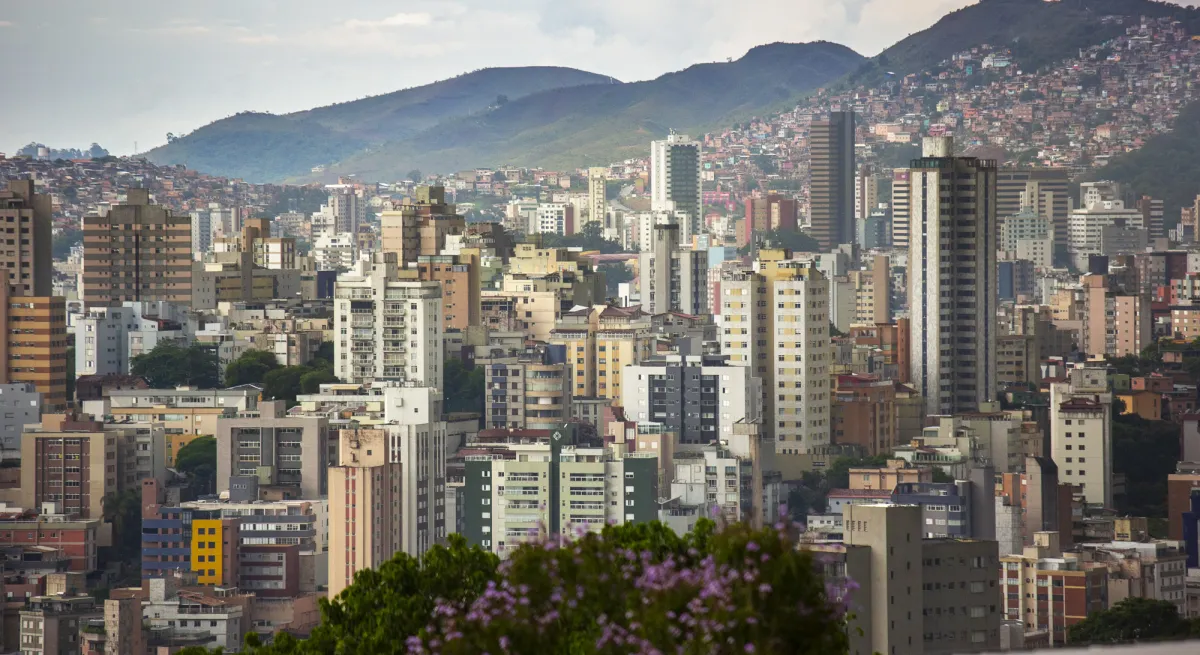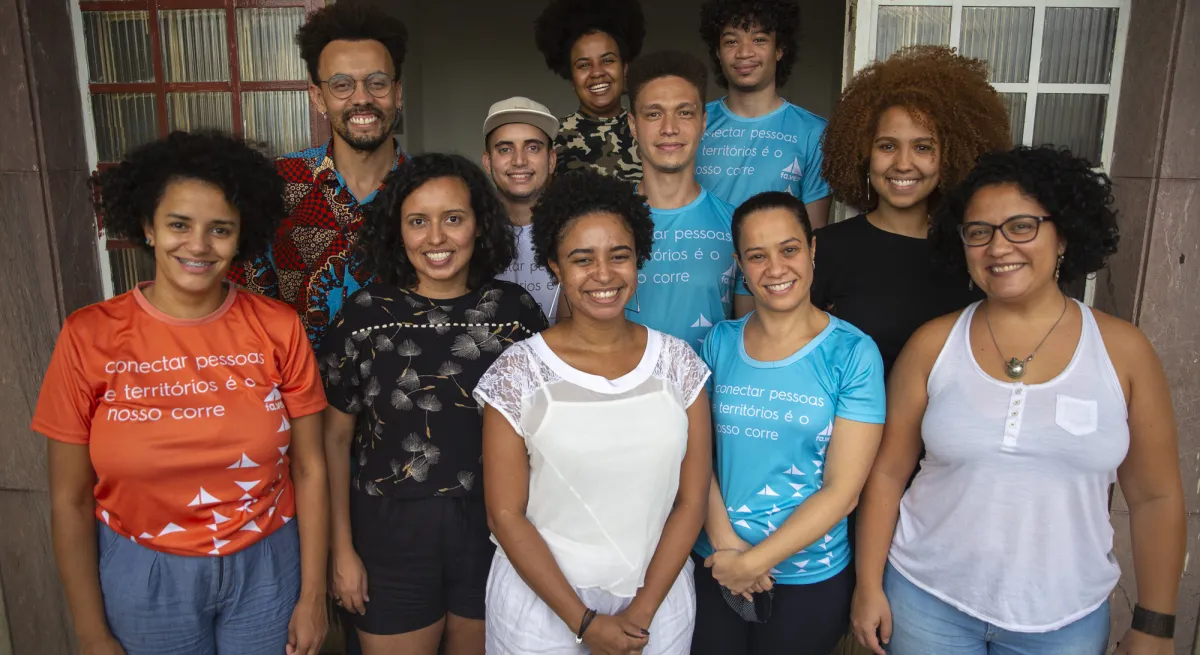In Brazil, inequalities disproportionately affect disadvantaged youth in peripheral regions. In Belo Horizonte, 480,000 people live in unplanned settlements, deprived of access to social and economic opportunities.
FA.VELA is an entrepreneurial, innovative, digital and inclusive education and learning hub that started its activities in 2014 in Morro do Papagaio, the popular name for Aglomerado Santa Lúcia- one of the largest favela in Belo Horizonte. Its mission is to promote diversity and social economic and environmental development through the empowerment of vulnerable groups and territories.
FA.VELA links young entrepreneurs with privileged and successful business owners. Through classes, mentorships, group talks and other services, the young entrepreneurs learn to (re)structure their businesses for further growth.
FA.VELA celebrates its 10th anniversary this year and Tatiana Silva, CEO and co-founder tells us, what is the approach of FA.VELA, the challenges of addressing wealth inequality in Belo Horizonte and what are their goals for the coming years with their plan to scale and create impact on the youth of Belo Horizonte and beyond.

Q: Tatiana, like many cities, Belo Horizonte faces significant wealth inequality. How does FA.VELA's approach, particularly through the Escola Digital project, aim to bridge this gap, and what impact have you seen so far?
FA.VELA works to bridge this gap by providing digital and entrepreneurial literacy to historically marginalised groups. In order to achieve our goal, we provide programmes on inclusive digital transformation and entrepreneurial literacy as well as the tools we understand are essential to make sure our project participants can make the best of their time with us and reduce the inequalities they face. This includes securing access to transportation, food, internet access and counselling while they are on their journey through the programme. We also understand that building a network and knowledge sharing among people with different backgrounds is essential to help bridge this gap, so we also engage privileged professionals to join us in our activities and contribute with mentorships or pro bono work.
Since 2020, through FA.VELA Escola Digital we have been able to impact 117 entrepreneurs, incubate 16 businesses and develop a network of 84 volunteer mentors. Many of the entrepreneurs who were once our students are now our partners and service providers, running successful enterprises that have grown and impacted many others in their communities.
Q: Can you share some information on the background of the entrepreneurs? You mainly work with women, LGBT+ and people of colour. Why are they disproportionally affected by wealth inequality?
Our entrepreneurs are mostly women (70%), people of colour (64%), and also members of the LGBT+ community (47%). They live in vulnerable territories and most of them run their businesses without ever having taken lessons on subjects like financial sustainability or even having knowledge or access to the technology that can help them. Imagine having to run your business with the help of only a mobile phone, while also juggling your personal life and without access to proper means of transport, proper internet access, and opportunities and tools that already exist but are out of reach. That is the reality of most of our entrepreneurs.
Wealth inequality basically deprives these entrepreneurs of opportunity, creating an environment which makes success and accomplishment almost impossible. While others, who open their businesses because of opportunity rather than necessity, start with the basic tools and resources they need to succeed. Our entrepreneurs have to fight for access to the same basic tools and resources, often having to do without them. In the end it becomes an unfair race as some already start many steps ahead.
We want to make sure that FA.VELA feels like a homebase for all our participants, and organisation that will be with them throughout their lives and place where they can get support, not just from us but from their peers as well.
Q: FA.VELA has empowered nearly 300 disadvantaged entrepreneurs through its programmes. Can you share a success story that exemplifies how FA.VELA's inclusive education has transformed the trajectory of one of these entrepreneurs?
Ludmilla Pereira runs a healthy food delivery service called “Trem Bão Culinária Saudável”. She participated in last year´s Corre Criativo and was also selected to be one the five entrepreneurs whose business was incubated during the second phase of the programme. During her journey she was able to increase her income significantly, pay for other courses in her field and hire new staff to help her – ensuring that all of them had great work conditions and providing opportunities for workers that also share a history of vulnerability. Ludmilla´s story is inspirational and shows how FA.VELA´s impact works indirectly as well.
She shared some of her experience with us: “During Corre Criativo in 2023, Trem Bão went through a literal metamorphosis of transformation and growth. I can highlight some of them: strengthening the brand´s potential; development of a strategy on how to position ourselves as a business; financial organisation; a view of the future and an expansion plan to include catering to corporate and private events; digital growth and development, and the strengthening of new partnerships. And to end on a great note, we are also currently on our way to becoming new chefs. Thanks to our financial incentive we are currently taking classes at a culinary school focused on healthy cooking. And it was all fundamentally due to our mentors and the structure created by FA.VELA, and ultimately their investors. To all those who make Corre Criativo happen, the staff, mentors and investors, please accept our tremendous gratitude.”
Q: One of the unique aspects of Escola Digital is its focus on bringing together people from vastly different socio-economic backgrounds. How has the collaboration between already successful entrepreneurs and the informal business owners contributed to breaking down barriers and fostering mutual growth?
We are currently entering our second year of the volunteer programme with the Julius Baer Foundation, where Julius Baer employees provide mentorships to our entrepreneurs on different subjects, and it has been an enriching experience for both sides.
Volunteer mentors gain a deep understanding of the reality of their mentees and the barriers they must overcome to create and maintain a successful business. On the other hand, our project participants receive mentorship from people who have great knowledge and success in their respective fields.
We were able to see how these encounters truly break down barriers and are extremely powerful. One of the mentors from last year´s programme, said: “It was a great experience, I was able to have a better understanding of the needs of entrepreneurs running small businesses. It was a mutual exchange in which we, as mentors, could learn about the difficulties faced by people in need of resources. To sum up, it was an amazing project.”

Q: What are some key challenges FA.VELA has faced in addressing social and economic disparities in Belo Horizonte, and what lessons have you learned that could be applied to similar initiatives in other cities?
Unfortunately, the philanthropic culture in Brazil is still not very strong. The resources available are, in many cases, not sufficient. Time and time again we see ourselves in the position of having to explain the value of what we do and why social change is not only about charity work.
Fiscal waiver laws are also incipient in our country, many groups are still not contemplated in these laws and one of these groups are the young entrepreneurs who are assisted by Corre Criativo. Digital inclusion projects are also not commonly the subject of fiscal waiver laws despite the fact that we live in an increasingly connected society.
Throughout the years we have learned how important it is to have a diverse way of obtaining resources to ensure financial security for our projects and our institution. We also learned the importance of working as a network, creating an active group around a common goal. Our network of partners has provided us with resources such as volunteer work, pro bono work and new partnerships. We could not have got this far if it weren´t for these resources.

Q: Looking ahead, what are your goals for FA.VELA in the next few years? How do you plan to scale your efforts and continue making a lasting impact on wealth inequality and entrepreneurship in Belo Horizonte and beyond?
In 2024, FA.VELA achieves 10 years of existence, and with this comes the inevitable question “what do we want for the next 10 years?”. We are focusing our efforts on strengthening our methodologies and teaching methods to ensure the best possible experience for our project participants. Internally, we are working on improving how we manage information and institutional processes to leverage the integration and performance of all our teams.
And finally, we want to make sure that FA.VELA feels like a homebase for all our project participants, an organisation that will be with them throughout their lives and a place where they can get support, not just from us but from their peers as well. To achieve this goal, we have been strengthening community culture at FA.VELA. A community where everyone - project participants, collaborators and partners - can exchange ideas, get support and share the common goal of creating a world with more justice and equality for all.
There are two sayings we often repeat here at FA.VELA that serve as inspiration as well as guidance. The first one is “empathy does not substitute experience”, which serves as a reminder that we must never presume that we know the needs of our audience. That is also the reason why having a diverse team is essential to us here at FA.VELA, only different perspectives can truly bring us closer to a solution when it comes to closing the inequality gap.
The second one is “being an entrepreneur in the favela is an act of resistance”. Thriving in an environment and in a reality that is not set up for success is truly a way of standing up to a system that is not equal. Overcoming the difficulties these entrepreneurs face and still be able to maintain a business is truly an achievement of resistance.
